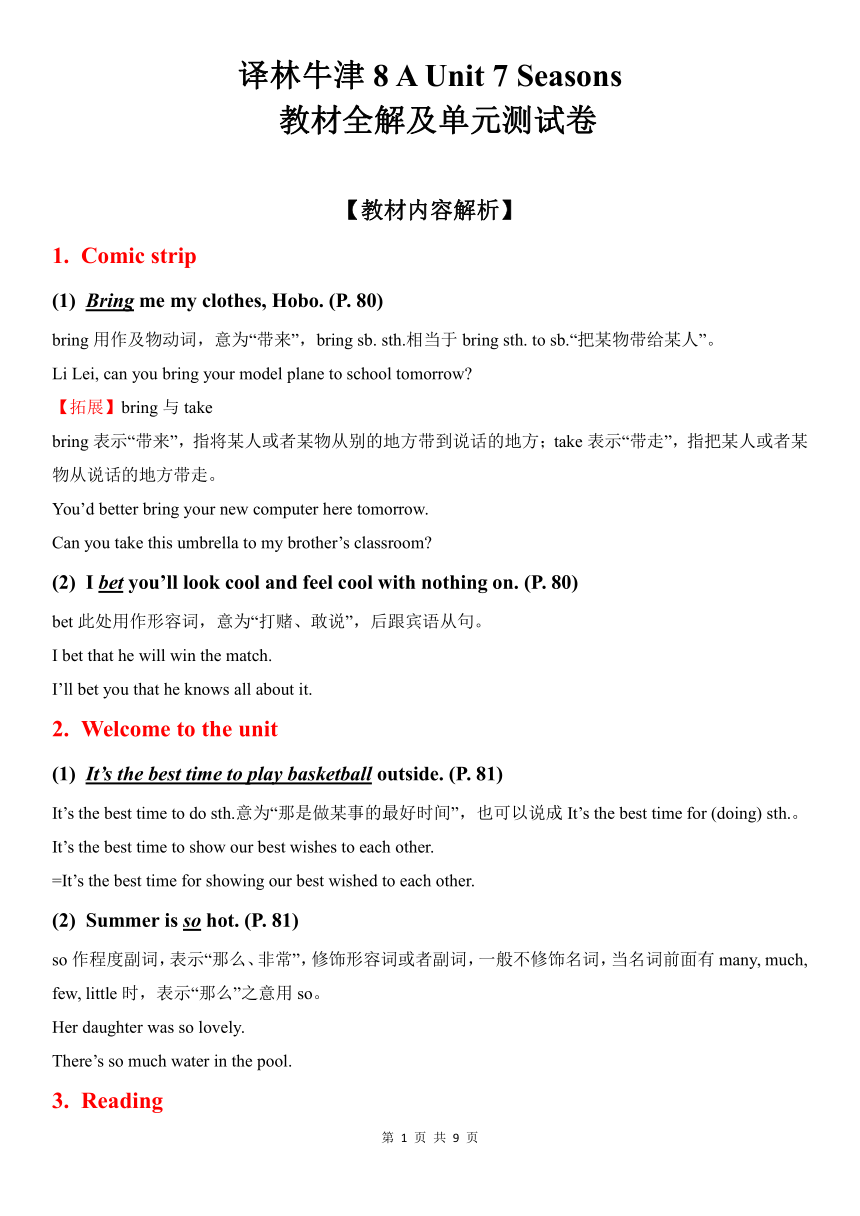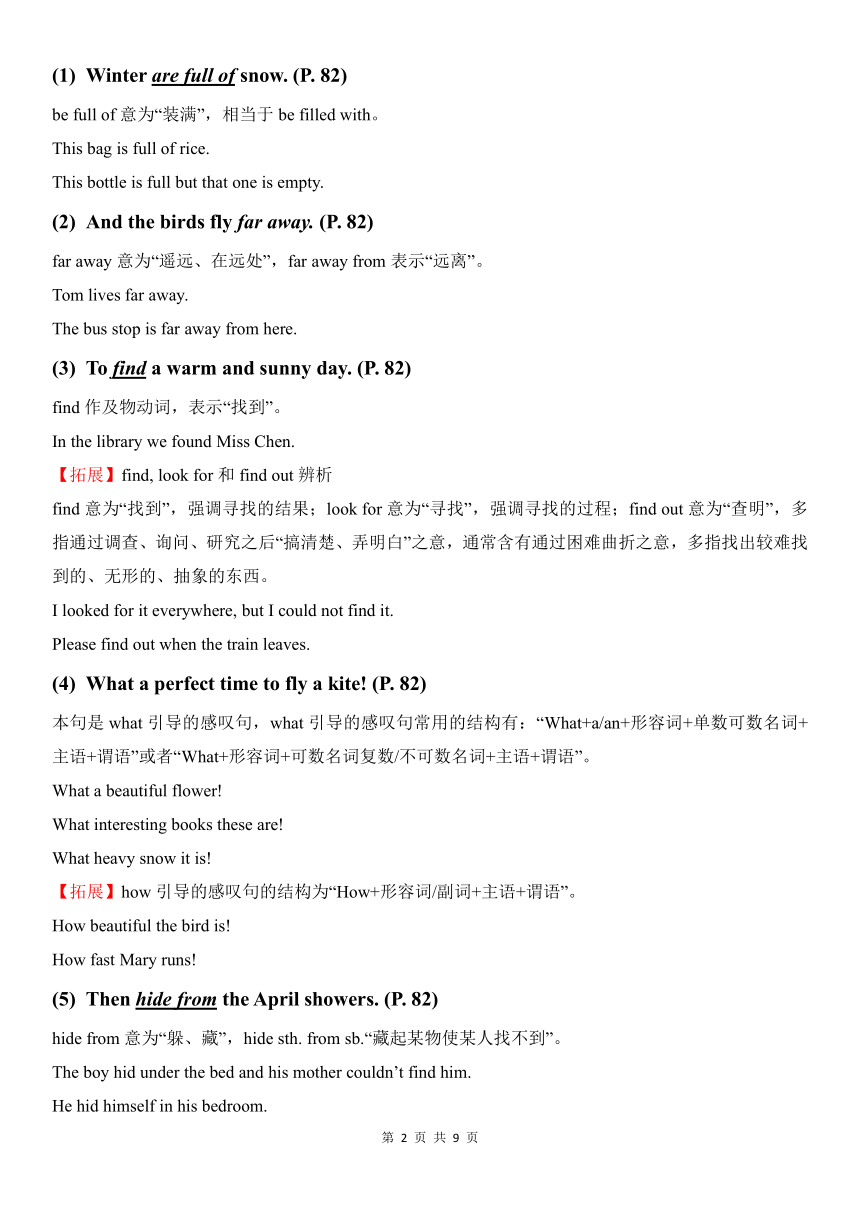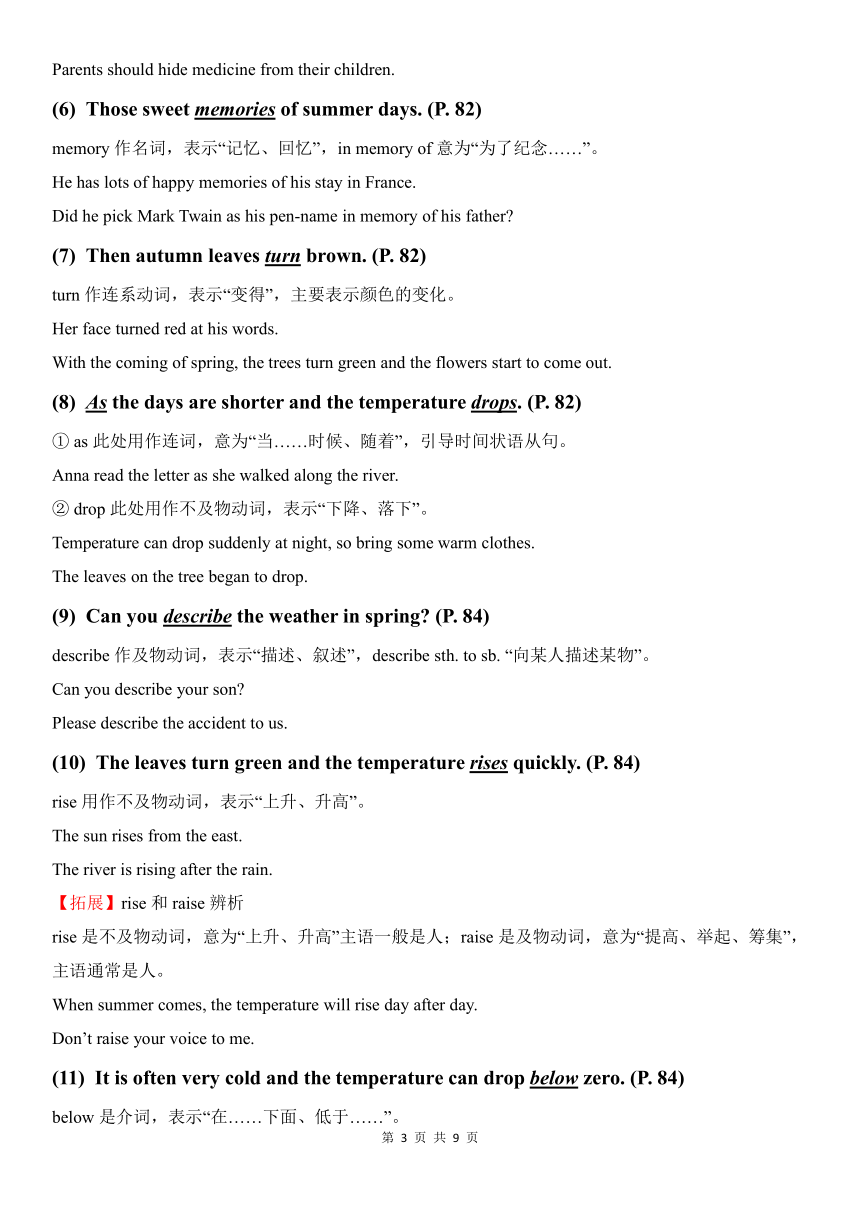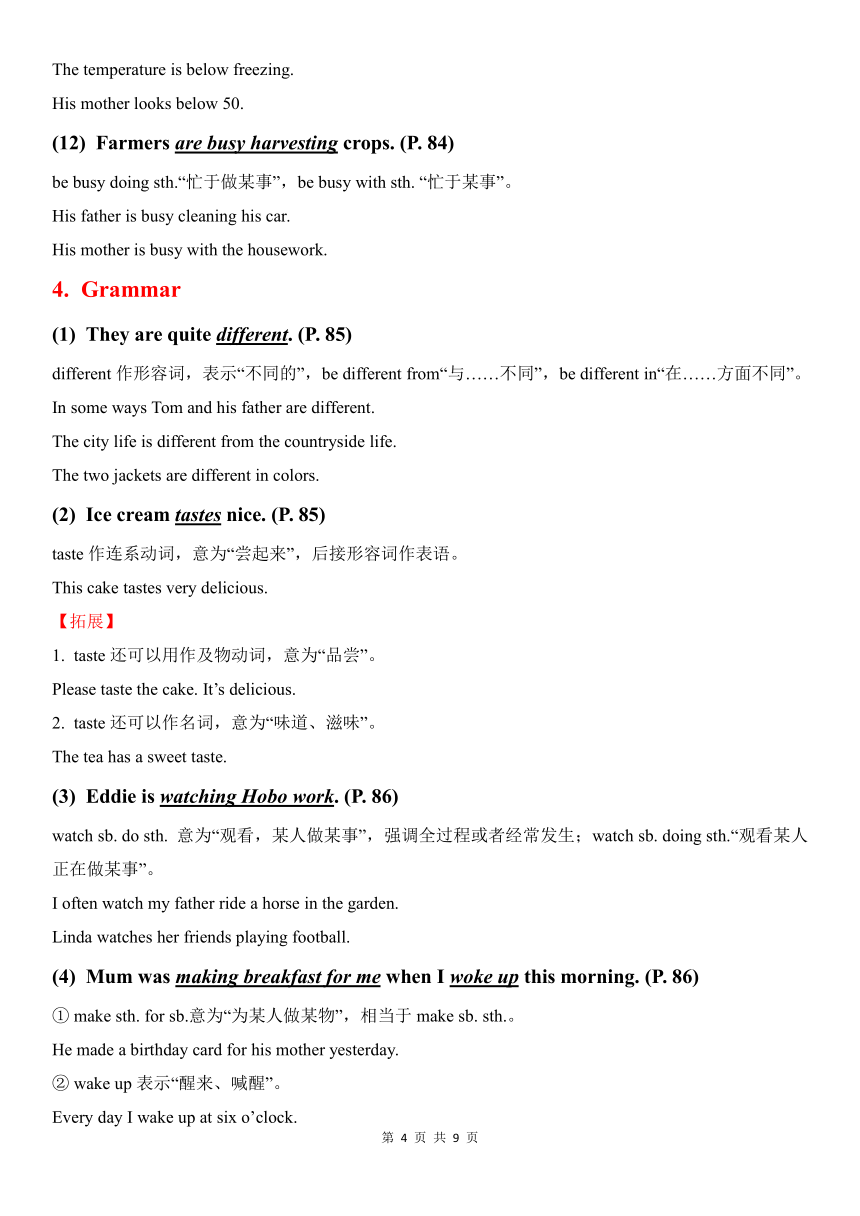Unit 7 Seasons 教材全解及单元测试卷
文档属性
| 名称 | Unit 7 Seasons 教材全解及单元测试卷 |

|
|
| 格式 | docx | ||
| 文件大小 | 31.4KB | ||
| 资源类型 | 试卷 | ||
| 版本资源 | 牛津译林版 | ||
| 科目 | 英语 | ||
| 更新时间 | 2022-04-09 22:08:09 | ||
图片预览




文档简介
译林牛津8 A Unit 7 Seasons
教材全解及单元测试卷
【教材内容解析】
Comic strip
Bring me my clothes, Hobo. (P. 80)
bring用作及物动词,意为“带来”,bring sb. sth.相当于bring sth. to sb.“把某物带给某人”。
Li Lei, can you bring your model plane to school tomorrow
【拓展】bring与take
bring表示“带来”,指将某人或者某物从别的地方带到说话的地方;take表示“带走”,指把某人或者某物从说话的地方带走。
You’d better bring your new computer here tomorrow.
Can you take this umbrella to my brother’s classroom
I bet you’ll look cool and feel cool with nothing on. (P. 80)
bet此处用作形容词,意为“打赌、敢说”,后跟宾语从句。
I bet that he will win the match.
I’ll bet you that he knows all about it.
Welcome to the unit
It’s the best time to play basketball outside. (P. 81)
It’s the best time to do sth.意为“那是做某事的最好时间”,也可以说成It’s the best time for (doing) sth.。
It’s the best time to show our best wishes to each other.
=It’s the best time for showing our best wished to each other.
Summer is so hot. (P. 81)
so作程度副词,表示“那么、非常”,修饰形容词或者副词,一般不修饰名词,当名词前面有many, much, few, little时,表示“那么”之意用so。
Her daughter was so lovely.
There’s so much water in the pool.
Reading
Winter are full of snow. (P. 82)
be full of意为“装满”,相当于be filled with。
This bag is full of rice.
This bottle is full but that one is empty.
And the birds fly far away. (P. 82)
far away意为“遥远、在远处”,far away from表示“远离”。
Tom lives far away.
The bus stop is far away from here.
To find a warm and sunny day. (P. 82)
find作及物动词,表示“找到”。
In the library we found Miss Chen.
【拓展】find, look for和find out辨析
find意为“找到”,强调寻找的结果;look for意为“寻找”,强调寻找的过程;find out意为“查明”,多指通过调查、询问、研究之后“搞清楚、弄明白”之意,通常含有通过困难曲折之意,多指找出较难找到的、无形的、抽象的东西。
I looked for it everywhere, but I could not find it.
Please find out when the train leaves.
What a perfect time to fly a kite! (P. 82)
本句是what引导的感叹句,what引导的感叹句常用的结构有:“What+a/an+形容词+单数可数名词+主语+谓语”或者“What+形容词+可数名词复数/不可数名词+主语+谓语”。
What a beautiful flower!
What interesting books these are!
What heavy snow it is!
【拓展】how引导的感叹句的结构为“How+形容词/副词+主语+谓语”。
How beautiful the bird is!
How fast Mary runs!
Then hide from the April showers. (P. 82)
hide from意为“躲、藏”,hide sth. from sb.“藏起某物使某人找不到”。
The boy hid under the bed and his mother couldn’t find him.
He hid himself in his bedroom.
Parents should hide medicine from their children.
Those sweet memories of summer days. (P. 82)
memory作名词,表示“记忆、回忆”,in memory of意为“为了纪念……”。
He has lots of happy memories of his stay in France.
Did he pick Mark Twain as his pen-name in memory of his father
Then autumn leaves turn brown. (P. 82)
turn作连系动词,表示“变得”,主要表示颜色的变化。
Her face turned red at his words.
With the coming of spring, the trees turn green and the flowers start to come out.
As the days are shorter and the temperature drops. (P. 82)
① as此处用作连词,意为“当……时候、随着”,引导时间状语从句。
Anna read the letter as she walked along the river.
② drop此处用作不及物动词,表示“下降、落下”。
Temperature can drop suddenly at night, so bring some warm clothes.
The leaves on the tree began to drop.
Can you describe the weather in spring (P. 84)
describe作及物动词,表示“描述、叙述”,describe sth. to sb. “向某人描述某物”。
Can you describe your son
Please describe the accident to us.
The leaves turn green and the temperature rises quickly. (P. 84)
rise用作不及物动词,表示“上升、升高”。
The sun rises from the east.
The river is rising after the rain.
【拓展】rise和raise辨析
rise是不及物动词,意为“上升、升高”主语一般是人;raise是及物动词,意为“提高、举起、筹集”,主语通常是人。
When summer comes, the temperature will rise day after day.
Don’t raise your voice to me.
It is often very cold and the temperature can drop below zero. (P. 84)
below是介词,表示“在……下面、低于……”。
The temperature is below freezing.
His mother looks below 50.
Farmers are busy harvesting crops. (P. 84)
be busy doing sth.“忙于做某事”,be busy with sth. “忙于某事”。
His father is busy cleaning his car.
His mother is busy with the housework.
Grammar
They are quite different. (P. 85)
different作形容词,表示“不同的”,be different from“与……不同”,be different in“在……方面不同”。
In some ways Tom and his father are different.
The city life is different from the countryside life.
The two jackets are different in colors.
Ice cream tastes nice. (P. 85)
taste作连系动词,意为“尝起来”,后接形容词作表语。
This cake tastes very delicious.
【拓展】
taste还可以用作及物动词,意为“品尝”。
Please taste the cake. It’s delicious.
taste还可以作名词,意为“味道、滋味”。
The tea has a sweet taste.
Eddie is watching Hobo work. (P. 86)
watch sb. do sth. 意为“观看,某人做某事”,强调全过程或者经常发生;watch sb. doing sth.“观看某人正在做某事”。
I often watch my father ride a horse in the garden.
Linda watches her friends playing football.
Mum was making breakfast for me when I woke up this morning. (P. 86)
① make sth. for sb.意为“为某人做某物”,相当于make sb. sth.。
He made a birthday card for his mother yesterday.
② wake up表示“醒来、喊醒”。
Every day I wake up at six o’clock.
Please wake up your younger sister.
I caught a bad cold. I had a high fever and coughed a lot...(P. 86)
① catch a cold意为“感冒”。
He catches a cold at this time every year.
I has a bad cold and sore throat.
② have a fever意为“发烧”,have a high fever意为“发高烧”。
When people catch a cold, they usually have a fever.
Integrated skills
Sunshine and blue skies will stay still with us for the rest of the week. (P. 87)
rest此处表示“其余的部分”,the rest of意为“其余的……、其它的……”,后可接可数名词后者不可数名词,当在句中作主语时,谓语动词的单复数与of后面的名词保持一致,若of后面的名词是单数可数名词或者不可数名词,谓语动词用单数形式;若of后面的名词是可数名词复数,谓语动词用复数形式。
The rest of the money is on the desk.
Some of the students are reading in the classroom and the rest of them are on the playground.
There will be a few showers today. (P. 87)
There will be...意为“将有……”,为There be结构的一般将来时。
There will be a football match on TV programme tomorrow evening.
How’s the weather in Beijing (P. 88)
How is the weather 意为“天气怎么样?”,相当于What’s the weather like 。
---What’s the weather like today
---It’s very cold.
---How is the weather in Shanghai
---It’s sunny.
This is Aunt Jane speaking. (P. 88)
This is...speaking是电话用语,表示“我是……”,询问“你是谁?”时,用Is that...speaking
---Is that Tom speaking
---This is Tom speaking.
It’s a bit cold and dry...(P. 88)
a bit意为“有点儿”。修饰形容词或者副词,相当于a little,但是a little可以直接修饰不可数名词,但是a bit不能,需要在a bit后面加上of才可以修饰不可数名词。
His bedroom is a little/a bit dirty.
There is a little/a bit of water in the glass.
【拓展】not a bit表示“一点也不”,相当于not at all,not a little意为“非常”,相当于very。
She isn’t bit tired.
She isn’t a little tired.
I’ll ring you later. (P. 88)
ring作及物动词,表示“给……打电话”,后面也可以加上up构成ring up短语。
Please ring the doctor.
Study skills
The high temperature makes people sleepy in the afternoon. (P. 89)
sleepy,表示“困倦的、瞌睡的”,在句中用作表语或者定语。
After lunch, I felt very sleepy.
He went to bed so late last night that he felt very sleepy in class.
The sudden heavy rain causes a lot of problems. (P. 89)
sudden作形容词,表示“突然的、忽然的”,副词是suddenly,意为“突然地”。
We all got wet with the sudden heavy rain.
His father’s sudden death made him very sad.
People are lucky to enjoy many sunny days. (P. 89)
lucky作形容词,意为“幸运的”,be lucky to do sth.“有幸做某事”。
He is a lucky dog.
He was lucky to catch the first bus.
They like snowball fights. (P. 89)
fight此处是名词,意为“打仗”,have a fight with sb. “与某人打架”, fight也可以作动词,fight with表示“与……打架”,fight for表示“为……打架”。
He often has a fight with his younger brother.
They fight for the rights.
Task
(1) It is very cold and everyone has to wear thick warm clothes...(P. 90)
everyone是不定代词,只能指人,其后不能跟of引起的短语,every one即可以指人也可以指物,后面可跟of引起的短语。
Everyone likes him.
Every one of the apples in the basket was bad.
During this season, you cannot see beautiful flowers or green trees but the land is quiet and beautiful. (P. 90)
land此处作不可数名词,意为“陆地”,作动词时,表示“着陆、降落”。
They can’t live on land.
The plane will land in 10 minutes.
We throw snowballs at each other, screaming and laughing. (P. 90)
① throw...at...意为“向……投……”。
Lisa threw a piece of paper at me.
② each other表示“彼此、互相”。
We should help each other and learn from each other.
We also make snowmen and use carrots for their noses. (P. 90)
use sth. for...表示“用某物来……”,后接名词、代词或者动名词,use sth. to do sth.“用某物做某事”。
We use computers for study.
He wants to use my computer fro playing games.
We use knives to cut things.
【重点短语和句型归纳】
重点短语
bring sb sth.
bring sth to sb把东西带给某人
look cool/ good/ beautiful看起来很酷、很好、很漂亮
go swimming/ jogging/ running 去游泳、慢跑、跑步
be full of 充满了
be full 吃饱了
far away from 离……很远
be away from= be off
forget to do sth 忘记做某事
hide from sp. 隐藏在
quiet streams 安静的水流
by a pool 在池塘旁边
turn brown/ yellow/ red 变成棕色、黄色、红色
turn around 转身,扭转局面
fall into piles 掉落成一堆堆
once again 又一次
fly away 飞远了
warm and windy 温暖的多风的
cloudy and bright 多云的明亮的
be busy with sth/ doing sth 忙于某事、做某事
stay with sb. 跟某人在一起
for the rest of 在其余的
take a shower 洗个澡(淋浴)
learn more about sth. 学习更多关于某事的东西
during the year 在这一年里
ring sb.= call sb. 打电话给某人
speak louder 讲话再大声点
take care 保重
cover sth./ sb. with sth. 给某人盖上某物
be covered in deep snow 被大雪盖住了
heavy rain/ frog 大雨、大雾
rain cats and dogs 倾盆大雨
at the weekend 在周末
around the city 环绕城市
snowball fights 打雪仗
30. throw snowball at each other 互相扔雪球
重点句型
1.it’s too cold to do sth. 天气太冷了不能做某事
2.it is often sunny/ windy/ rainy ... 经常是晴天、大风天、下雨天
3.I bet that...我打赌……
4.it’s the best time to do sth. 这是做某事最好的时机
5.what a perfect time to fly a kite! 这是多么完美的放风筝的一天啊!
6.how is the weather today/ yesterday 今天/昨天天气怎么样?
【语法讲解】
简单句的五种基本句型
英语句子按照结构来分,可分为简单句、并列句和复合句三种类型。筒单句是由一个主谓结构组成的句子,其中的各个句子成分都是词或短语:
(1)主谓结构:主语十谓语(不及物动词)(S+V)。
Sandy is singing.桑迪正在唱歌。
(2)主谓宾结构:主语十谓语(及物动词)十宾语(名词、代词、不定式、动名词等)(S+ V+DO)。
They like the birds.他们喜欢那些鸟。
(3)主系表结构:主语十系动词(be动词、感官动词等)+表语(名词、形容词、介词短语等)(S+V+P)。
The swan is beautiful.天鹅很漂亮。
(4)主谓双宾语结构:主语十谓语(及物动词)+间接宾语(人)+直接宾语(物)(S+V+IO+DO)。
Ann shows her friend some photos.安给她的朋友看一些照片。
(5)主谓宾宾补结构:主语十谓语(及物动词)+宾语十宾语补足语(名词、形容词、现在分词、不定式等)( S+V+DO+OC)。
Millie found her answer right.米莉发现她的答案正确。
I saw him crying just now.刚才我看见他在哭。
教材全解及单元测试卷
【教材内容解析】
Comic strip
Bring me my clothes, Hobo. (P. 80)
bring用作及物动词,意为“带来”,bring sb. sth.相当于bring sth. to sb.“把某物带给某人”。
Li Lei, can you bring your model plane to school tomorrow
【拓展】bring与take
bring表示“带来”,指将某人或者某物从别的地方带到说话的地方;take表示“带走”,指把某人或者某物从说话的地方带走。
You’d better bring your new computer here tomorrow.
Can you take this umbrella to my brother’s classroom
I bet you’ll look cool and feel cool with nothing on. (P. 80)
bet此处用作形容词,意为“打赌、敢说”,后跟宾语从句。
I bet that he will win the match.
I’ll bet you that he knows all about it.
Welcome to the unit
It’s the best time to play basketball outside. (P. 81)
It’s the best time to do sth.意为“那是做某事的最好时间”,也可以说成It’s the best time for (doing) sth.。
It’s the best time to show our best wishes to each other.
=It’s the best time for showing our best wished to each other.
Summer is so hot. (P. 81)
so作程度副词,表示“那么、非常”,修饰形容词或者副词,一般不修饰名词,当名词前面有many, much, few, little时,表示“那么”之意用so。
Her daughter was so lovely.
There’s so much water in the pool.
Reading
Winter are full of snow. (P. 82)
be full of意为“装满”,相当于be filled with。
This bag is full of rice.
This bottle is full but that one is empty.
And the birds fly far away. (P. 82)
far away意为“遥远、在远处”,far away from表示“远离”。
Tom lives far away.
The bus stop is far away from here.
To find a warm and sunny day. (P. 82)
find作及物动词,表示“找到”。
In the library we found Miss Chen.
【拓展】find, look for和find out辨析
find意为“找到”,强调寻找的结果;look for意为“寻找”,强调寻找的过程;find out意为“查明”,多指通过调查、询问、研究之后“搞清楚、弄明白”之意,通常含有通过困难曲折之意,多指找出较难找到的、无形的、抽象的东西。
I looked for it everywhere, but I could not find it.
Please find out when the train leaves.
What a perfect time to fly a kite! (P. 82)
本句是what引导的感叹句,what引导的感叹句常用的结构有:“What+a/an+形容词+单数可数名词+主语+谓语”或者“What+形容词+可数名词复数/不可数名词+主语+谓语”。
What a beautiful flower!
What interesting books these are!
What heavy snow it is!
【拓展】how引导的感叹句的结构为“How+形容词/副词+主语+谓语”。
How beautiful the bird is!
How fast Mary runs!
Then hide from the April showers. (P. 82)
hide from意为“躲、藏”,hide sth. from sb.“藏起某物使某人找不到”。
The boy hid under the bed and his mother couldn’t find him.
He hid himself in his bedroom.
Parents should hide medicine from their children.
Those sweet memories of summer days. (P. 82)
memory作名词,表示“记忆、回忆”,in memory of意为“为了纪念……”。
He has lots of happy memories of his stay in France.
Did he pick Mark Twain as his pen-name in memory of his father
Then autumn leaves turn brown. (P. 82)
turn作连系动词,表示“变得”,主要表示颜色的变化。
Her face turned red at his words.
With the coming of spring, the trees turn green and the flowers start to come out.
As the days are shorter and the temperature drops. (P. 82)
① as此处用作连词,意为“当……时候、随着”,引导时间状语从句。
Anna read the letter as she walked along the river.
② drop此处用作不及物动词,表示“下降、落下”。
Temperature can drop suddenly at night, so bring some warm clothes.
The leaves on the tree began to drop.
Can you describe the weather in spring (P. 84)
describe作及物动词,表示“描述、叙述”,describe sth. to sb. “向某人描述某物”。
Can you describe your son
Please describe the accident to us.
The leaves turn green and the temperature rises quickly. (P. 84)
rise用作不及物动词,表示“上升、升高”。
The sun rises from the east.
The river is rising after the rain.
【拓展】rise和raise辨析
rise是不及物动词,意为“上升、升高”主语一般是人;raise是及物动词,意为“提高、举起、筹集”,主语通常是人。
When summer comes, the temperature will rise day after day.
Don’t raise your voice to me.
It is often very cold and the temperature can drop below zero. (P. 84)
below是介词,表示“在……下面、低于……”。
The temperature is below freezing.
His mother looks below 50.
Farmers are busy harvesting crops. (P. 84)
be busy doing sth.“忙于做某事”,be busy with sth. “忙于某事”。
His father is busy cleaning his car.
His mother is busy with the housework.
Grammar
They are quite different. (P. 85)
different作形容词,表示“不同的”,be different from“与……不同”,be different in“在……方面不同”。
In some ways Tom and his father are different.
The city life is different from the countryside life.
The two jackets are different in colors.
Ice cream tastes nice. (P. 85)
taste作连系动词,意为“尝起来”,后接形容词作表语。
This cake tastes very delicious.
【拓展】
taste还可以用作及物动词,意为“品尝”。
Please taste the cake. It’s delicious.
taste还可以作名词,意为“味道、滋味”。
The tea has a sweet taste.
Eddie is watching Hobo work. (P. 86)
watch sb. do sth. 意为“观看,某人做某事”,强调全过程或者经常发生;watch sb. doing sth.“观看某人正在做某事”。
I often watch my father ride a horse in the garden.
Linda watches her friends playing football.
Mum was making breakfast for me when I woke up this morning. (P. 86)
① make sth. for sb.意为“为某人做某物”,相当于make sb. sth.。
He made a birthday card for his mother yesterday.
② wake up表示“醒来、喊醒”。
Every day I wake up at six o’clock.
Please wake up your younger sister.
I caught a bad cold. I had a high fever and coughed a lot...(P. 86)
① catch a cold意为“感冒”。
He catches a cold at this time every year.
I has a bad cold and sore throat.
② have a fever意为“发烧”,have a high fever意为“发高烧”。
When people catch a cold, they usually have a fever.
Integrated skills
Sunshine and blue skies will stay still with us for the rest of the week. (P. 87)
rest此处表示“其余的部分”,the rest of意为“其余的……、其它的……”,后可接可数名词后者不可数名词,当在句中作主语时,谓语动词的单复数与of后面的名词保持一致,若of后面的名词是单数可数名词或者不可数名词,谓语动词用单数形式;若of后面的名词是可数名词复数,谓语动词用复数形式。
The rest of the money is on the desk.
Some of the students are reading in the classroom and the rest of them are on the playground.
There will be a few showers today. (P. 87)
There will be...意为“将有……”,为There be结构的一般将来时。
There will be a football match on TV programme tomorrow evening.
How’s the weather in Beijing (P. 88)
How is the weather 意为“天气怎么样?”,相当于What’s the weather like 。
---What’s the weather like today
---It’s very cold.
---How is the weather in Shanghai
---It’s sunny.
This is Aunt Jane speaking. (P. 88)
This is...speaking是电话用语,表示“我是……”,询问“你是谁?”时,用Is that...speaking
---Is that Tom speaking
---This is Tom speaking.
It’s a bit cold and dry...(P. 88)
a bit意为“有点儿”。修饰形容词或者副词,相当于a little,但是a little可以直接修饰不可数名词,但是a bit不能,需要在a bit后面加上of才可以修饰不可数名词。
His bedroom is a little/a bit dirty.
There is a little/a bit of water in the glass.
【拓展】not a bit表示“一点也不”,相当于not at all,not a little意为“非常”,相当于very。
She isn’t bit tired.
She isn’t a little tired.
I’ll ring you later. (P. 88)
ring作及物动词,表示“给……打电话”,后面也可以加上up构成ring up短语。
Please ring the doctor.
Study skills
The high temperature makes people sleepy in the afternoon. (P. 89)
sleepy,表示“困倦的、瞌睡的”,在句中用作表语或者定语。
After lunch, I felt very sleepy.
He went to bed so late last night that he felt very sleepy in class.
The sudden heavy rain causes a lot of problems. (P. 89)
sudden作形容词,表示“突然的、忽然的”,副词是suddenly,意为“突然地”。
We all got wet with the sudden heavy rain.
His father’s sudden death made him very sad.
People are lucky to enjoy many sunny days. (P. 89)
lucky作形容词,意为“幸运的”,be lucky to do sth.“有幸做某事”。
He is a lucky dog.
He was lucky to catch the first bus.
They like snowball fights. (P. 89)
fight此处是名词,意为“打仗”,have a fight with sb. “与某人打架”, fight也可以作动词,fight with表示“与……打架”,fight for表示“为……打架”。
He often has a fight with his younger brother.
They fight for the rights.
Task
(1) It is very cold and everyone has to wear thick warm clothes...(P. 90)
everyone是不定代词,只能指人,其后不能跟of引起的短语,every one即可以指人也可以指物,后面可跟of引起的短语。
Everyone likes him.
Every one of the apples in the basket was bad.
During this season, you cannot see beautiful flowers or green trees but the land is quiet and beautiful. (P. 90)
land此处作不可数名词,意为“陆地”,作动词时,表示“着陆、降落”。
They can’t live on land.
The plane will land in 10 minutes.
We throw snowballs at each other, screaming and laughing. (P. 90)
① throw...at...意为“向……投……”。
Lisa threw a piece of paper at me.
② each other表示“彼此、互相”。
We should help each other and learn from each other.
We also make snowmen and use carrots for their noses. (P. 90)
use sth. for...表示“用某物来……”,后接名词、代词或者动名词,use sth. to do sth.“用某物做某事”。
We use computers for study.
He wants to use my computer fro playing games.
We use knives to cut things.
【重点短语和句型归纳】
重点短语
bring sb sth.
bring sth to sb把东西带给某人
look cool/ good/ beautiful看起来很酷、很好、很漂亮
go swimming/ jogging/ running 去游泳、慢跑、跑步
be full of 充满了
be full 吃饱了
far away from 离……很远
be away from= be off
forget to do sth 忘记做某事
hide from sp. 隐藏在
quiet streams 安静的水流
by a pool 在池塘旁边
turn brown/ yellow/ red 变成棕色、黄色、红色
turn around 转身,扭转局面
fall into piles 掉落成一堆堆
once again 又一次
fly away 飞远了
warm and windy 温暖的多风的
cloudy and bright 多云的明亮的
be busy with sth/ doing sth 忙于某事、做某事
stay with sb. 跟某人在一起
for the rest of 在其余的
take a shower 洗个澡(淋浴)
learn more about sth. 学习更多关于某事的东西
during the year 在这一年里
ring sb.= call sb. 打电话给某人
speak louder 讲话再大声点
take care 保重
cover sth./ sb. with sth. 给某人盖上某物
be covered in deep snow 被大雪盖住了
heavy rain/ frog 大雨、大雾
rain cats and dogs 倾盆大雨
at the weekend 在周末
around the city 环绕城市
snowball fights 打雪仗
30. throw snowball at each other 互相扔雪球
重点句型
1.it’s too cold to do sth. 天气太冷了不能做某事
2.it is often sunny/ windy/ rainy ... 经常是晴天、大风天、下雨天
3.I bet that...我打赌……
4.it’s the best time to do sth. 这是做某事最好的时机
5.what a perfect time to fly a kite! 这是多么完美的放风筝的一天啊!
6.how is the weather today/ yesterday 今天/昨天天气怎么样?
【语法讲解】
简单句的五种基本句型
英语句子按照结构来分,可分为简单句、并列句和复合句三种类型。筒单句是由一个主谓结构组成的句子,其中的各个句子成分都是词或短语:
(1)主谓结构:主语十谓语(不及物动词)(S+V)。
Sandy is singing.桑迪正在唱歌。
(2)主谓宾结构:主语十谓语(及物动词)十宾语(名词、代词、不定式、动名词等)(S+ V+DO)。
They like the birds.他们喜欢那些鸟。
(3)主系表结构:主语十系动词(be动词、感官动词等)+表语(名词、形容词、介词短语等)(S+V+P)。
The swan is beautiful.天鹅很漂亮。
(4)主谓双宾语结构:主语十谓语(及物动词)+间接宾语(人)+直接宾语(物)(S+V+IO+DO)。
Ann shows her friend some photos.安给她的朋友看一些照片。
(5)主谓宾宾补结构:主语十谓语(及物动词)+宾语十宾语补足语(名词、形容词、现在分词、不定式等)( S+V+DO+OC)。
Millie found her answer right.米莉发现她的答案正确。
I saw him crying just now.刚才我看见他在哭。
